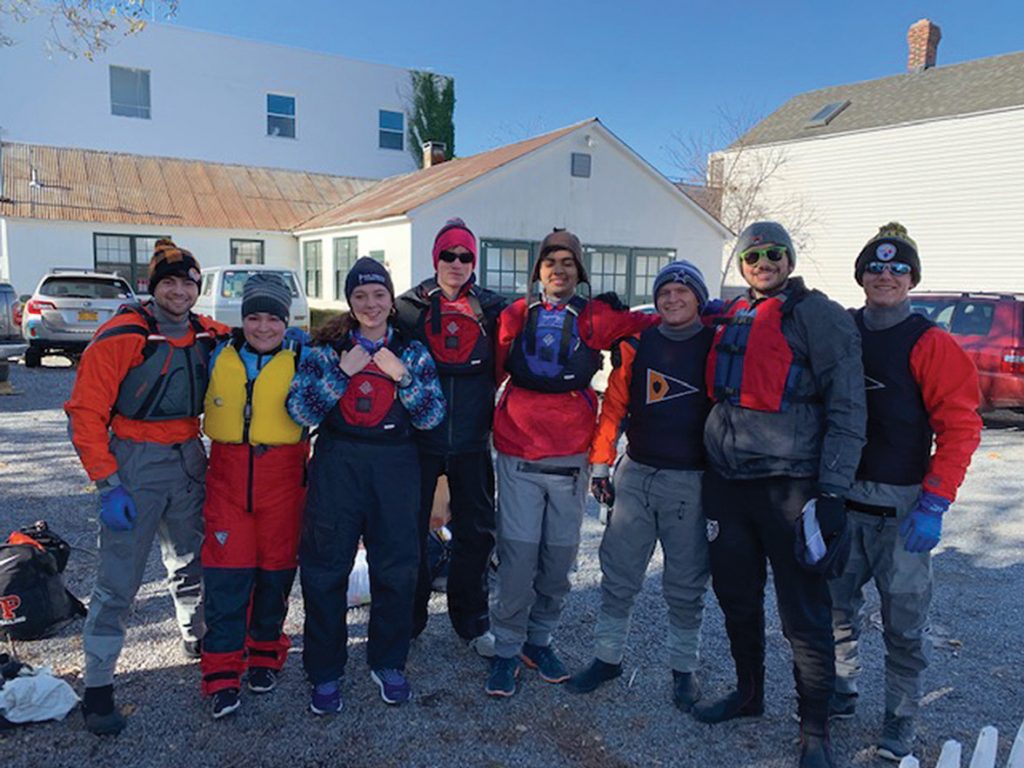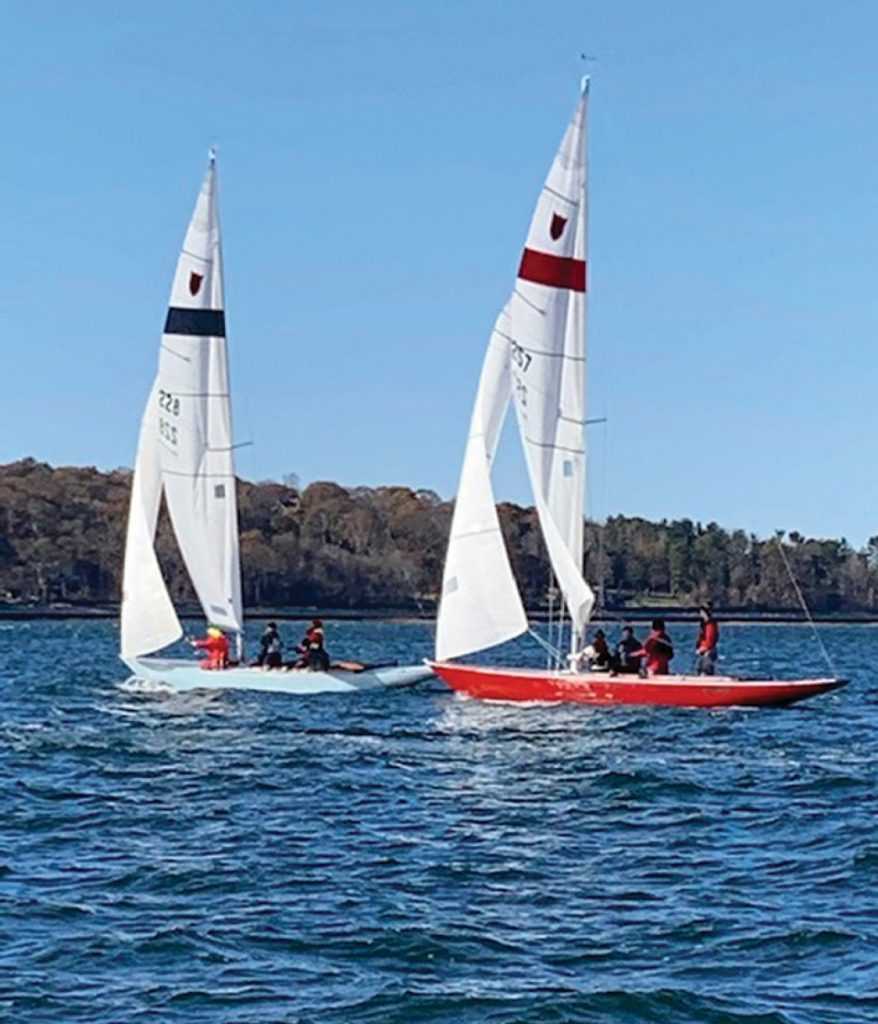By Tom Darling
In 1869, Princeton University’s football team travelled to New Brunswick, New Jersey to play the first intercollegiate football contest. One hundred and fifty years and eleven days later, the Princeton Club Sailing Team led a hardy group of post-season intercollegiate sailors in the debut of their own peculiar sporting event.
Sailing 30-foot Shields keelboats in 30-degree temperatures and 25-knot winds on Oyster Bay’s West Harbor on November 16, the kids now called it “extreme sailing.” We prefer to label it “keelboat frostbiting, college style.” Sponsored by Oakcliff Sailing and the Princeton Sailing team, the POKI (Princeton Oakcliff Keelboat Challenge) was an exhilarating and “totally cool” introduction to the teams involved in late season sailing.

Ready for battle, the Princeton Sailing Club team gathers outside Oakcliff. © Tom Darling
To put this event in historical perspective, college sailing was launched by undergraduates around the country in a mélange of wooden boats in the late 1920s. Princeton Sailing Team folklore points to Arthur Knapp (Princeton class of 1928), author of the timeless Race Your Boat Right and a founder of Larchmont’s first dinghy frostbiting fleet, as its college sailing pioneer. Legend supported by letters in the Friends of Princeton Sailing archives has Knapp challenging his Brown cousin, Alfie Loomis, to a singlehanded dinghy race in New York waters. Believable and verifiable or not, we suspect every college sailing venue, be it the Charles River, Annapolis or Southern California, has its founding mythology.
In the case of the POKI, we were out to create a regatta from scratch, and fulfill a longtime goal of the Princeton team to have a keelboat venue of its own. Princeton has sailed its dinghy fleet from a site generously shared by Raritan Yacht Club in Perth Amboy, New Jersey since the early 1990s. The team dodged disaster in 2012, commandeering the Crew team’s rowing shell trailers to move their FJ fleet to safety before Superstorm Sandy wiped out the Raritan site. Back in business in 2017, the team was still looking to expand its fleet, especially to accommodate the larger sailors who just don’t fit in an FJ. But where to go? How to get boats? And people to run the show?
Intercollegiate keelboat racing was a major focus on sailing in the 1970s. Keelboat fleets, first and foremost the Shields Class, were the jousting yard for many of that era’s collegiate aces, from Robbie Doyle to Gary Jobson to Bruce Nelson, among many others. With the service academies like Navy, Kings Point and Coast Guard maintaining fleets, the Keelboat Championship became every bit as prestigious an as traditional dinghy events like the War Memorial.
While those Shields fleets gradually aged and dwindled, newer boats like Sonars, J/22s and J/70s entered the picture. But in the new intercollegiate scene, keelboats were largely being used for match racing and team racing. The Princeton team saw an opportunity: Expand keelboat fleet racing. Sponsor a keelboat event after the final fall regatta. Make it an open invitation event, for fun, and put it at a first-class location.
A high-performance training center for sailors who’ve progressed beyond traditional coaching methods, Oakcliff is a hotbed of match racing. Their fleet of Match 40s attracts an international set of match racers to 18 ultra-competitive annual events. We approached Executive Director Dawn Riley and presented the concept: “Off-season keelboat fleet racing for intercollegiate sailors.” She and Oakcliff founder Hunt Lawrence, whose grandson is Princeton Class of 2023, were all in. OK, now, how does one start a regatta from scratch? Make a list of ingredients, in a particular order, one leading to the next. Our list read: “Name, Venue, Date, Boat, Race Committee, Etcetera…”

Webb Institute (blue hull) rounds the weather mark ahead of Princeton “Orange” team (red hull). With winds gusting to 30 knots, spinnakers stayed inside the Shields and the downwind legs were tight. © Tom Darling
Name: Simply combining the words “Princeton Oakcliff Keelboat Invitational” yielded POKI. But seriously, there was a lot of discussion about the name. A little bit like naming a child. Once you decide, you’re stuck with it!
Venue: As WindCheck readers know, we had that at the highest level in Oakcliff. Many of you have seen Dawn in the documentary film Maiden, about the Whitbread Round the World Race’s first female crew. Keelboats are in Oakcliff’s DNA. Given the brisk conditions on race day, we were fortunate to have a sheltered western appendage of Oyster Bay, West Harbor, as the racecourse. A few 30-knot gusts came rocketing off Centre Island, the peninsula that forms the east-west channel of Oyster Bay, but the chop was low and the water not yet cold.
Date: We were threading a needle between the end of the MAISA racing season last weekend in October and the inevitable Thanksgiving gales. November 16 was the one and only date. We plan to do it a week earlier next year, when temperatures average 40 to 50 degrees and the harbor launches run to the moorings, and racers are fresh from Fall Championships and ready for some fun sailing. Said one Princeton crew, “I’m from Chicago. It may be windy here, but no way as cold.” I can attest to that, having sailed at the old Timme Angsten Regatta in Belmont Harbor where Thanksgiving sailing meant salting down the interiors of the ancient Lehman 10s to prevent slipping on the ice. In comparison, November in Oyster Bay seemed balmy.
Boat: We looked at three fleets: two collections of Sonars and the Oakcliff fleets. We saw Oakcliff’s Match 40s as too much to handle for first-time keelboat sailors. As it turned out, the event date made this decision for us. The Sonars of Seawanhaka Corinthian Yacht Club and The WaterFront Center were on the hard. The dedicated team at Oakcliff and Ronnie Sacardo kept five Shields in the water for us, all in mint condition. Sailing without spinnakers due to the wind speeds, with crews of four, the Shields with their low freeboard weren’t the driest boats, but eminently handleable by the novice crews. The quality of the rigging and boat preparation by Oakcliff was outstanding, and there were relatively few breakdowns in the tough conditions.
Race Committee: Here again, we benefitted from the expertise of Oakcliff’s top PRO, Todd Field (Princeton ‘76). Try writing a Notice of Race and Sailing Instructions on your own, template or no template, without a legal degree! Todd eased through the process, and set up all the marks, starting systems and flags. We supplied the boat drivers, lunch and the enthusiasm. The race management was top shelf, all of the student sailors agreed.
Etc.: Believe it or not, we almost forgot to invite guests to populate our first event. Note to self: Do not forget to invite the competitors! For an inaugural event, we were fortunate to the Webb Institute bring an experienced crew and its own RIB with coaches from nearby Glen Cove, affording ample safety coverage. A team of NY Maritime sailors, coached by Oakcliff graduate Avi Lessman, had their hands full in the breezy conditions. Even getting off the mooring in a Shields with the wind cranking 25-plus is difficult. Princeton brought its “Orange”(skipper Conor Mraz) and “Black”(skipper Max Lawrence) teams.
A tremendous boost to sailors’ spirits was the presence of Hunt Lawrence’s Holland 32 lobster boat Spare Parts, sporting a heated cabin and carrying two football team-sized tankards of coffee and hot chocolate. This is a feature that needs to be repeated at all late season events! With that all in place, we were able to run eight solid windward/leeward races. Starts were crisp, roundings were tight, and once the seasoned dinghy sailors got a sense for the speed and power of the Shields, boat speed was consistent. Aside from cold hands and some numb feet, the teams handled extreme conditions with aplomb.
What would we do differently? First, we’d bring tools and parts to repair boats, keeping them in the RIBS on the course. Boat repair is the biggest time sink of these events, so you need a mobile repair shop. Keelboats seem to have three times the moving parts of a dinghy. Second, we’d tell sailors not to wear dinghy gear, and to bring warm hats, gloves and boots. We lost some crew to cold, wet feet, something with which all dinghy frostbiters can identify.
We’d also extend the weekend and have people arrive on Friday and stay in the Oakcliff Bunkhouse. There is no better hospitality for a college event than Oakcliff, and in November it’s wide open. Our biggest anxiety was feeding a football team’s worth of hungry sailors. We learned a lot about the dietary habits of Genzumer sailor breakfast eaters. Given a choice of fruit, Dunkin’ Munchkins, coffee, breakfast bars and energy bars, they chose energy bars two to one. Even more surprisingly, they ate the whole bag of apples. Consumer marketers take heed.
We wound the POKI up with a trophy presentation and brief gam for sailors to recharge and get dry. The POKI perpetual trophy, won here in November 2019 by the Princeton Black Team, will reside at Oakcliff. Thanks to Oakcliff for their generous donation of glassware for individual prizes to all the crews.
Thanks also to the Lawrence family, the safety boat drivers and Webb coaches who and the amazing Oakcliff team for making the inaugural POKI a success. We’re shooting for six to eight boats next year. Winning team gets to bring two boats’ worth of crew the following year. ■
Tom Darling is a 1975 graduate of Princeton University and was captain of the school’s Varsity Sailing Team in 1974 and ’75. He races IODs in the Western Long Island Sound and Nantucket fleets and crews on a classic wooden Alerion sloop in Nantucket Harbor.




